Wimmera (Hachette Australia Books 2017), the debut novel for Mark Brandi, is a short, simple, perfectly-crafted tale that captures the mood of small-town Australia while exploring a secret and a crime that lie hidden there. In 1989, best friends Ben and Fab spend the long, hot summer days fishing for yabbies and playing cricket. Parts of their lives remain unspoken, such as what happened to Ben’s neighbour, Daisy, and the violent temper of Fab’s father. The arrival of an unsettling stranger piques the boys’ curiosity – maybe he’s a secret agent? – but signals sinister changes in the boys’ lives. Twenty years on, Fab is still living by the river in the same town, nursing his dashed hopes and unfulfilled dreams. Then a body is found, and the past rears up to collide with the present.
The language of the book is arresting: simple, easy-to-read, evocative and nuanced. The author nails the environment of a child of the eighties through dialogue, references to pop culture and broader societal norms of the time. The characters of both Fab and Ben are real enough to imagine them walking through the door at any moment. Brandi moves deftly between this childhood reminiscence and the later section; we see the boy in the man, the history of the past entwined with the current situation. The author’s background in criminal justice is evident in the tight representation of the legal aspects.
The story encapsulates the theme of childhood friendship: the desperate, urgent need for belonging; the petty grievances that threaten to disrupt your equilibrium; the shifting allegiances; the feeling that you might do anything – anything at all – for your friend; the feeling that nothing else matters except what is true right here, right now. The strength of that bond, and what might happen if it threatens to break.
The book navigates some fraught territory, and some readers should heed trigger warnings. It is an emotional story that traverses some dark places of fear, betrayal and revenge.
The most accomplished aspect of this novel is the bold and confident use of white space. The author never says more when he can make do with less, he passes over events with the lightest of hands, he gives us just enough detail that we are left wanting more, but also, conversely, dreading what we might read on the next page. The suspense and creeping sense of foreboding makes this a great crime read, but the journey we travel – with Fab and Ben tugging on our heartstrings the entire way – makes it also a great literary story.

